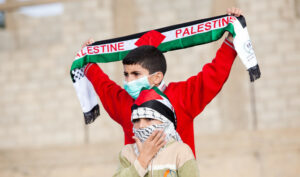A RED RIVER
this so-called Rio Tinto corporation definitely AIN’T!
Which has locked out 600 mine-workers,
many the children of those Okie grapes of wrath
who blew into Boron, California to work
the borax mines two generations ago
and whose worker grand-kids
now are cut, backstabbed, locked out and hurting,
sucker-punched by profit-greed,
out not merely of work but replaced
by no-skill, any-skill, numbskulls, scab-ballocks,
dignity down the drain fried like rotten eggs
in the Mojave desert sun.
Soon the car’ll have to go, and it’ll be a walkin’
George destiny of homeless families
sleepin’ under newspapers, no way back
unless and until:
even MORE UNION, as uniting’s so essential,
even MORE UNION, as the bosses’ bullshit
is piled so high you can land helicopters
on the roofs of their lies,
even MORE UNION, because the UNION’S
our thunderful strength, the reason why
Londoners like we here in San Francisco today
are demonstrating at Rio Tinto headquarters
in the U.K., for Californians locked out of their jobs.
Because any workers dumped or robotically replaced
points the accusing fingers at the number one disgrace,
which is to have to eat the shit that comes from capitalism’s
filthy face,
when what we’re gonna do is flush it down and restore
the human race.
*
ADVICE TO THE PRESIDENT
You know how much
death has visited
people since that Texas
slimeball slapped its
evil coalition across
the mouth of the world?
Mister President, do you
seriously believe that
by killing human beings
in other countries you
protect us here? Mister
President, think.
Think and immediately
get on the phone
to all our enemies and
invite them to our, or
accept the invitation to
meet them in their lands,
and sit down and agree
on how all mass weapons
of war, all atomic and nuclear
bomb materials are to be
disengaged and once and
for all buried under the sea.
Give us up, Mister President,
and the world will have peace.
That is the only way now.
Surrender our weapons and the
world will recognize that that is
what you meant by “Yes, we can!”
*
BLUE
About a decade ago, upon returning to North Beach in San Francisco after some months
of readings in Europe, I learned to my surprise and dismay that my old friend, the poet
Blue by name (her birth name is Janice Duff, though she was always known as Blue to those of us who knew her on the San Francisco streets), was in the downtown jail at 850
Bryant St.: she had apparently killed a local longshoreman, the boyfriend of a girlfriend
of hers, with whom she had been staying, in a domestic spat that developed into a drunken argument and then exploded into lethal violence.
The next day I went to the jail and we spoke together through the separation glass. Blue
was understandably shaky,—she was facing murder charges—and fearful that what had
happened would lead to her losing the house she owned in Northern California (she
had left North Beach some years earlier, and had only returned to appear in a reading
marking the publication of Brenda Knight’s new book, Women of the Beat). At the same
time, she was still Blue, with that tremulous, almost adolescent shyness combined with
the vivacious strength of a woman who’s been around the block more than a few times.
For the crime she did eight years/nine months time, and that’s no easy rhyme.
We stayed in touch, with letters and books sent to the prison, and when she was released in 2005, I happened to be giving a reading in Southern California, and I had a chance to meet her and her sister and fellow poet and her faithful friend, Wayne Miller,
briefly but definitely: she looked…,well, Blue—-lovely, if a bit older, obviously happy
to be free of prison.
Then, when Soheyl Dahi of Sore Dove Press, for whom the story of the Beats and their
legacy in the 70’s and 80’s mean a great deal, told me he planned to publish Blue’s poems and asked me to introduce them, I naturally assented.
Blue is one of the first poets I met on the North Beach streets in the early 70’s. She was
running the readings at the old Coffee Gallery. There was a little stage and the poets would be called up to sound their wares, and Blue would read as well, and it was there I first heard—and was impressed by—her language.
Since the 60’s poetry has poured forth from microphones all over the cafes and parks and schools of this land. Most poems, when you see them on the page, are rather staid;
that is, they’re literary writing that the poet has publicly voiced. With Blue’s, something else is happening. The reader will not go far into this book before he or she finds the self wanting to say the words out loud. And it won’t be a performance trick. Recepted voice
is so close to the act of writing in Blue’s compositional dynamic that at times they are
almost indistinguishable.
The key here lies in the word as a dramatic modality.
Even in what amounts to a meditation on Loneliness, where there is much “is-ness” in
the business of revealing the component parts of that very American pie, i.e, Loneliness
is this, or Loneliness is that, Blue transforms the philo-meditative dimension of her poetic
“essay” into a dramatic monologue that one is almost forced to utter to him-or-herself.
And she does it by concentration and convolution of language wherein one perception
leads to the next, as in the manner of Olson’s projectivism.
She does the same, and perhaps as or even more effectively, in the final work of this book, her battle-hymn against Hope, which affirms Hope’s center. Beauty, through a series of brilliant negations of sappy and superficial and hypocritical Hopes.
And she can be contrary in her contradictoriness to a provocatively unsettling degree.
For example, in her poem called “Uncle Sam” she denounces the U.S. with the same
bitter fervor that one finds these days in the best anti-war poems aimed against the
ignorant surfeit of patriotism that’s come with the latest pack of bush-shitters. But
Blue’s bitterness is that of a southern cracker, one who identifies with a notion of
“pure south”, of Cherokees uprooted and sent on the Trail of Tears because of the discovery of gold, and when she identifies with the Confederacy, she’ll say: “Oh, you
think the Civil War was fought over slavery,” in such a way that you know she is refer-
ring to the motion of money again, the greed of the North (though no cracker can deny
that the slave trade helped create the South from the get-go as well, and that even Cherokees kept slaves, though they called them “belongings,” like pieces of furniture).
Yes, there’s that “Up the Rebel!” like “Up the Irish!” which this throwback to the
days of the Barbary Coast would shout from one corner of Specs Cafe or The Saloon to
the other, and that too is a contradiction because some of her closest friends were African-Americans, like Bob Kaufman, with whom she published a memorable poetic dialogue, Closing Time Till Dawn; and her insistence on Blue as her name, and the Blue dress she always wore—considering that was the color and name of the Union in the Civil War—nourishes the contradictory nature of this widely friendly and wildly
enthusiastic poet.
Here’s a book that shows herself in poetic action, receiving the blows of memory at
the level of street that are both herself and some of the heaviest burdens the soul can
carry. And enduring them into self-surpassing. With poetry’s surpassion.
Here’s Blue.
2006
*
JACK KEROUAC:
A MEDITATION
When I was
student young
one day the
Kerouac way
suddenly was
felt far and near
like an eruption
of the American
moment I’d only
been hanging around
or talking about
or studying about
but not living
in the sense of
being inside its
being inside me,
and from that time
forward I was
the word for my
self within:
My ear-drums
could sound,
the tympany
of my tongue
could mystify
with holy galores,
and the motion
of my breath
upon the waters
of the streets
where I’d wept
and hallelujahed
would become
the adventure of
the life I’d give
my life for:
Poetry! That’s
Jack Kerouac’s path
in verse and jazz
prosody: Poetry!
*
MANTRA FOR MAHMOUD DARWISH
Mah
Mahmoud
Mahmouddar
Mahmouddarwish
Mahmouddarwishgrande
Mahmouddarwishgrandepo
Mahmouddarwishgrandepoet
Mahmouddarwishgrandepoetla
Mahmouddarwishgrandepoetlanou
Mahmouddarwishgrandepoetlanouveau
Palestine chantera tes mots comme des cris
Incendiaires et pleins de compassion dans les oreilles
du lendemain glorieux
*
PAKISTAN
No, it wasn’t a punishment for harboring Talibani
on your eastern slopes or even in your capital city.
No, it wasn’t a punishment for allowing the American
government to dictate the terms of anti-terrorism.
It was the reign of the rains, pure and simple water
because the clouds are sick of all the rot in the world,
all the abuse of women, the trafficking of them and kids,
the eyes of porn, the sperm-oil spurts of dead men
enslaved to perpetual indifference, the hunger that looks
out of the eyes of children for food, understand?
Food is what we’re yelling for in your ears, we’re starving
and a volcano’s going to erupt, a tsunami’s rearing up,
the earth’s quaking under us, fires spreading over our land,
monsoon, typhoon in the last years of this katun: we’re starving
and only water can save us, and it’s killing us! It’s flooding
and drowning us, soaking down to our soul, O undersea,
O underseasons,
O undersea sons
Where is the whale that can drink this whole flood, this
oil of the blood and the flames of this war-sick world,
in the immense cave of whose belly, we will have to live
until we re-learn the alphabet of the future from scratch?
All our gods have failed.
Peace is the only one left.
*
RAUL SALINAS PRESENTE !
He was a pitch and a blend of soul
and pinto wisdom, was Raul Salinas,
a mix of mestizo riffs and radium
idioms, slanging sounds from dungeons
he’d lived in. A heart that worked its way
up through sincerity, humility and compassion
to live permanently in the mouth of his poems,
and those ever-tender eyes. So that with Raul
you always knew you were in the company
of companero, not simply a companero but
the essence of what that word means.
And how all his activities in Austin and San
Francisco, the Latino and Black communities
he worked with, the centers he cultured,
the bookstores he grew, where revolutionary
energies always felt at home and free from
prison with the weapon of the poem,—O when,
O when the santos come marching, O when
the santos come marching in, you can be sure
Raul will be in that number. The Raul who was,
the Raul who is. Raul Salinas, Presente!
*
SLICK SATIN
The satin of BP’s slick
has killed millions of fish
and still it’s taxed shit-all,
and 11 exploded corpses
are bloodcrusted on its hands.
And don’t give me please
the scolding of the President.
He needs that fucking oil
for his drones and copters
to keep killing innocents abroad.
Let’s hear it for… statistics:
How many animals are murdered
in the poor and battered Gulf?
How many soldiers suicided
and overdosing in Afghanistan,
Iraqistan, Newyorkistan, Iranistan,
Sanfranciscistan. How many are
raising their knives to have done
with their humiliated lives
worth less than barrels of oil.
Or putting gun-barrels to brains
instead of making the BP rats
meet the most gigantic cats in
human history, licking our chops,
dying for ratatoui between our teeth.
*
OIL WATER
Oil-water, a spill of gold
that’s killed workers, animals.
Cross the border. Drill a hole.
Arizona, why you so cold?
Tears in Detroit people’s eyes:
the only water not privatized.
Motown lowdown Louis Joe:
All’s backwards, doncha know?
35 thousand without any, who
refuse to send their daughters
to ho for pennies, who shout:
Retaw, Retaw they backwards
cry: Water!Water one day will
sink this stinkingsystem of money-
stuffed lying mouths, our pliers
will get into their mugs, yank all
the rotten teeth out of their bite,
fit those mouths over the pipes
where the spill of such swill of
profits finally will be plugged,
and corporate thieves, downright
plunderers of what’s decent in life
will guzzle till they drown of death,
and all in Detroit, New Orleans and
Cleveland too will raise their glasses
full of simple aitch-two-oh, and toast
and sing, because no sink or tub will be
without it, The Water Song:
Agua! Acqua! Eau!Wasser! Voda!
Hallelujah, Nature’s natural again!
*
THE CHILDREN
allover will remember
their legs their arms,
the amputated spaces
will be Nothing branded
into their little souls,
never to forget, Israel,
you shattered their vessels
with your gunfire, shit on
the word, said fuck you
to the fetus in the womb.
You not they pissed on
your own wholly unholy
tetragramaton, its letters
a fraud and a fake.
I wish I could feed you
hand grenades in your mug,
I want to stuff dead children
into your eyes, lovers of learning
lies.
May selah be broken
in your mouth, may amen
never find chapter and verse,
may your food turn into
the gangrenous limbs of the
children you’ve felled,
those little trees of sparks.
You’ve killed David over
and over, you star of death.
O aliyah, how low!
O victory of defeat!
O stones growing in
the clenches of fists
enraged,
against you,
you rattler of bones!
______________________________
Jack Hirschman (United States, December 13, 1933 – August 22, 2021) was an poet and social activist who wrote more than 100 volumes of poetry and essays.
His first volume of poetry was A Correspondence of Americans, published in 1960 by Indiana University Press. Other boos are Black Alephs (Trigram Press, 1969), Lyripol (City Lights, 1976), The Bottom Line (Curbstone, 1988), and Endless Threshold (Curbstone, 1992), The Arcanes. He was appointed Poet Laureate of San Francisco in 2006, co founded and directed the International Poetry Festival in San Francisco, in partnership with the San Francisco Public Library.
He translated many books from German, French, Spanish, Italian, Russian, Albanian, and Greek.




